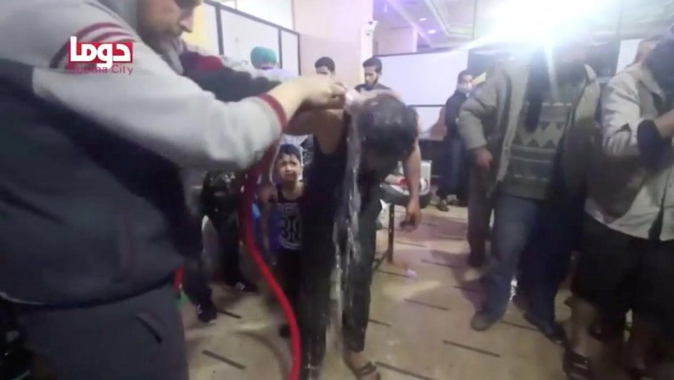Syria 'chemical weapons' attack: Christian charity 'deeply alarmed' as West's response comes under spotlight
The West's response to atrocities in Syria came under the spotlight on Monday as horrific images purported to show a chemical weapons attack on a rebel-held town on Saturday.
If the death toll is confirmed it would be the worst chemical attack in Syria since more than 80 died in Khan Sheikhoun in early April last year.
US President Donald Trump warned there would be a 'big price to pay' for the attack in Douma, in the Eastern Ghouta region, near the capital Damascus, branding Syria's President Bashar al-Assad an 'animal'.
The US joined France in signing a statement threatening to respond but it is not yet clear what that response will be.
Hours after the attack an airstrike hit a Syrian military airport. The Syrian government and its ally Russia blamed Israel for the attack after initially blaming the US. The White House denied it was behind the deadly strike on the Tiyas airbase, known as T4, near the city of Homs.
The UK is in urgent talks with allies at the United Nations last night and British foreign secretary Boris Johnson said the 'international community must respond'. The UN's security council, where Russia holds a permanent seat, is set to hold an emergency meeting.
'We condemn the use of chemical weapons by anyone, anywhere,' said Johnson. 'We are in close touch with our allies following these latest reports. Those responsible for the use of chemical weapons have lost all moral integrity and must be held to account.'
However parliament's decision to reject military intervention in Syria in 2013 has received fresh criticism.
Spot on - again we see the use of chemical weapons and the West does absolutely nothing. Remember the excuse used by the then Labour opposition and Tory rebels for blocking action in 2013? Syria was getting rid of the weapons.Tell today’s victims that. Votes have consequences ... https://t.co/vl21VLkQXe
— George Osborne (@George_Osborne) 8 April 2018
Tom Tugendhat, chairman of the Commons foreign affairs committee, said military action should be considered. 'I'm somewhat disappointed that my own government has not decided to respond already,' he told the BBC.
This is why @UN agreed the 2005 Responsibility to Protect. This is why @ICRC Geneva Conventions added the 1925 Gas Protocol. This is why @JoCox @Alison_McGovern and I argued there are legitimate uses of force. Standing by as kids are gassed isn’t pacifism, it’s tolerating evil. https://t.co/B4Hysd7NA8
— Tom Tugendhat (@TomTugendhat) 8 April 2018
However Labour leader Jeremy Corbyn stopped short of blaming Assad and said the need for 'real negotiations for peace and a political settlement in Syria could not be more urgent'.
It is thought that meaningful military action would require the backing of parliament. However despite statements of condemnation there were few voices calling for military intervention from the West.
Pope Francis used his traditional Sunday address to say 'nothing can justify' chemical attacks and called for those responsible for a suspected attack in Syria to seek negotiations.
'There is not a good or a bad war, and nothing can justify such instruments that exterminate defenceless people and populations,' Francis said.
'Let's pray that the responsible politicians and military leaders choose another path: that of negotiations, the only one that can bring peace.'

Catholic charity Aid to the Church in Need is providing emergency aid to those in Syria and spokesman John Pontifex told Christian Today: 'We are deeply concerned for all those suffering in Syria and deeply alarmed at reports of a chemical attack.
'Our thoughts and prayers are with the people we are supporting and helping [in Syria] and we hope to continue helping through this time of great crisis.'
UNICEF's executive director also would not be drawn on what the West's response should be.
'The children of Syria have witnessed and experienced unimaginable suffering over the past seven years. This can be stopped. It needs to stop now. Children are dying before our eyes,' she said.











